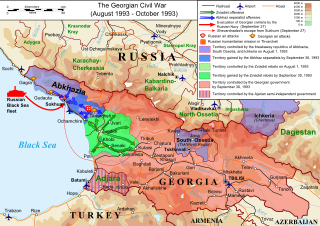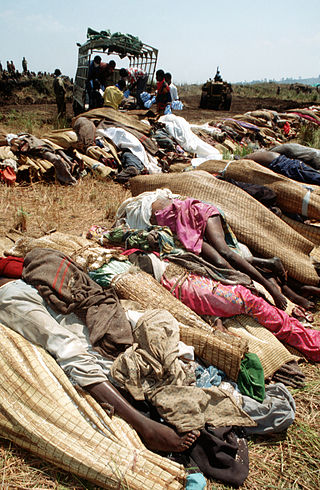
The United Nations Observer Mission in Georgia (UNOMIG) was established by United Nations Security Council Resolution 858 on 24 August 1993 to verify compliance with a 27 July 1993 ceasefire agreement between the Republic of Georgia and forces in Abkhazia with special attention given to the situation in the city of Sukhumi, Georgia. It was also to investigate reports of ceasefire violations, attempt to resolve such incidents with the parties involved, and to report to the Secretary-General of the United Nations on the implementation of its mandate. 88 military advisors were authorized to be deployed to the region. It ended on 15 June 2009, when Russia vetoed an extension of the mission. The last observers left the region on 15 July 2009.

The United Nations Assistance Mission for Iraq (UNAMI) was formed on 14 August 2003 by United Nations Security Council (UNSC) Resolution 1500 at the request of the Iraqi government to support national development efforts.

United Nations Security Council Resolution 1781 was unanimously adopted on 15 October 2007. The resolution extended the mandate of the United Nations Observer Mission in Georgia (UNOMIG), which was to expire 15 October 2007, the day of the vote, until 15 April 2008. Furthermore, it "strongly urges all parties to consider and address seriously each other’s legitimate security concerns, to refrain from any acts of violence and provocation, including political action or rhetoric, and to comply fully with previous agreements regarding ceasefire and non-use of violence."

United Nations Security Council resolution 849, adopted unanimously on 9 July 1993, after noting with concern the recent fighting around Sukhumi in the disputed region of Abkhazia, the Council requested the Secretary-General Boutros Boutros-Ghali to send his Special Envoy to the region in order to reach agreement for a ceasefire between Abkhazia and Georgia, and once implemented, authorised a dispatch of 50 military observers. It was the first Security Council resolution on the conflict.

United Nations Security Council resolution 864, adopted unanimously on 15 September 1993, after reaffirming resolutions 696 (1991), 747 (1992), 785 (1992), 793 (1992), 804 (1993), 811 (1993), 823 (1993), 834 (1993) and 851 (1993), the Council noted the continuing situation in Angola and went on to condemn and place international sanctions on UNITA.

United Nations Security Council resolution 876, adopted unanimously on 19 October 1993, after reaffirming resolutions 849 (1993), 854 (1993) and 858 (1993) concerning the Georgian–Abkhazian war, the council determined that the situation continued to constitute a threat to international peace and security.

United Nations Security Council resolution 892, adopted unanimously on 22 December 1993, after reaffirming resolutions 849 (1993), 854 (1993), 858 (1993), 876 (1993) and 881 (1993) on the Georgian–Abkhazian war and Resolution 868 (1993) concerning the safety of United Nations peacekeepers, the council discussed the phased deployment of 50 military observers in Georgia.

United Nations Security Council resolution 896, adopted unanimously on 31 January 1994, after reaffirming resolutions 849 (1993), 854 (1993), 858 (1993), 876 (1993), 881 (1993) and 892 (1993) on the Georgian–Abkhazian war and Resolution 868 (1993) concerning the safety of United Nations peacekeepers, the Council considered the possible establishment of peacekeeping force in Abkhazia and Georgia, and discussed the peace process.

United Nations Security Council resolution 925, adopted unanimously on 8 June 1994, after reaffirming all resolutions on the situation in Rwanda, particularly resolutions 912 (1994) and 918 (1994), and Resolution 868 (1993) on the safety of United Nations peacekeepers, the council deployed additional battalions and extended the mandate of the United Nations Assistance Mission for Rwanda (UNAMIR) until 9 December 1994.

United Nations Security Council resolution 965, adopted unanimously on 30 November 1994, after reaffirming all resolutions on the situation in Rwanda, particularly resolutions 872 (1993), 912 (1994), 918 (1994), 925 (1994) and 955 (1994), the Council extended the mandate of the United Nations Assistance Mission for Rwanda (UNAMIR) until 9 June 1995 and expanded its operations.

United Nations Security Council resolution 971, adopted unanimously on 12 January 1995, after reaffirming resolutions 849 (1993), 854 (1993), 858 (1993), 876 (1993), 881 (1993), 892 (1993), 896 (1994), 901 (1994), 906 (1994), 934 (1994) and 937 (1994), the Council extended the United Nations Observer Mission in Georgia (UNOMIG) until 15 May 1995.

United Nations Security Council resolution 993, adopted unanimously on 12 May 1995, after reaffirming all resolutions on Georgia, particularly 971 (1995), the Council discussed efforts for a political settlement between Georgia and Abkhazia and extended the mandate of the United Nations Observer Mission in Georgia (UNOMIG) until 12 January 1996.

United Nations Security Council resolution 1124, adopted unanimously on 31 July 1997, after reaffirming all resolutions on Georgia, particularly Resolution 1096 (1997), the Council extended the mandate of the United Nations Observer Mission in Georgia (UNOMIG) until 31 January 1998.

United Nations Security Council resolution 1339, adopted unanimously on 31 January 2001, after reaffirming all resolutions on Abkhazia and Georgia, particularly Resolution 1311 (2000), the Council extended the mandate of the United Nations Observer Mission in Georgia (UNOMIG) until 31 July 2001.

United Nations Security Council resolution 1393, adopted unanimously on 31 January 2002, after reaffirming all resolutions on Abkhazia and Georgia, particularly Resolution 1364 (2001), the Council extended the mandate of the United Nations Observer Mission in Georgia (UNOMIG) until 31 July 2002.

United Nations Security Council resolution 1427, adopted unanimously on 29 July 2002, after reaffirming all resolutions on Abkhazia and Georgia, particularly Resolution 1393 (2002), the Council extended the mandate of the United Nations Observer Mission in Georgia (UNOMIG) until 31 January 2003.

United Nations Security Council resolution 1462, adopted unanimously on 30 January 2003, after reaffirming all resolutions on Abkhazia and Georgia, particularly Resolution 1427 (2002), the council extended the mandate of the United Nations Observer Mission in Georgia (UNOMIG) until 31 July 2003.

United Nations Security Council resolution 1494, adopted unanimously on 30 July 2003, after reaffirming all resolutions on Abkhazia and Georgia, particularly Resolution 1462 (2003), the Council extended the mandate of the United Nations Observer Mission in Georgia (UNOMIG) until 31 January 2004 and endorsed the establishment of a police component.

United Nations Security Council Resolution 1590, adopted unanimously on 24 March 2005, after recalling resolutions 1547 (2004), 1556 (2004), 1564 (2004), 1574 (2004), 1585 (2005) and 1588 (2005) on the situation in Sudan, the Council established the United Nations Mission in Sudan (UNMIS) for an initial period of six months.

United Nations Security Council Resolution 1752 was unanimously adopted on 13 April 2007.


















